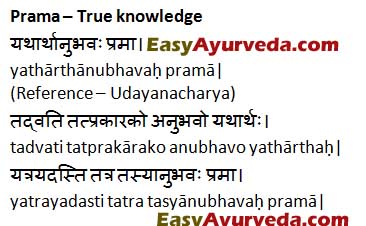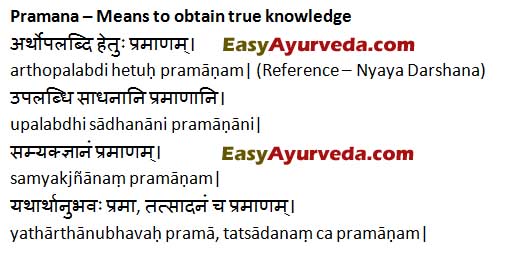Means to Attain True Knowledge – Prama, Prameya, Pramata and Pramana
By Dr. Regina Antony
True, transparent, sterile, unadulterated knowledge doesn’t come that easily. It needs keen observance, dedicated perseverance & penance, determined learning, hawk-eye concentration and moreover a proper sense-mind coordination. True knowledge is necessary to attain the aim of life, which is salvation. The attainment of true knowledge is only possible with the knowledge of the following –
Table of Contents
Prama – True knowledge

Prama is known as real knowledge.
Obtaining knowledge as it is, is called Prama.
For example, identifying a rope as a rope and not as a snake.
The true, as it is and wholesome experience is Prama.
For example, identifying the disease Rakta-Pitta by observing blood mixed stools.
Read related – Importance Of Soul In Perception Of Knowledge: Atma Jnana
Aprama – Untrue knowledge
It is opposite to Prama.
Aprama means false or untrue knowledge.
For example, seeing a rope and identifying it as a snake.
Read related – Pratyaksha Bhadaka Bhava: Constraints For Knowledge Perception
Types of Prama –
Prama or true knowledge is of 4 types –
1. Pratyaksha – knowledge by direct perception through sense organs
2. Anumiti – knowledge through inference
3. Upamiti – knowledge through comparison
4. Shabda – knowledge through testimony
Read related – Pratyaksha Pramana: Knowledge Perception Through Sense Organs
Prameya – Object of knowledge
The object of knowledge is called Prameya. Since knowledge is obtained from each and everything in this universe, Prameya is said to be innumerable.
For example,
As per botany, details of plants and trees is Prameya.
As per Sankhya Darshana, Prameya are the 25 principles of creation (Panchavimshati tatva).
As per Ayurveda, the Tridoshas, Trimala, Sapta Dhatu, Pancha Mahabhutas, Triguna etc are considered as Prameya.
Read related – Sankhya Darshana and Ayurveda: Relation and Similarities
Pramata – One who obtains true knowledge
The soul (Atma), the doer (kartha), or the person who obtains this true knowledge is called Pramata. He experiences the true knowledge (Prama) of the object (Prameya).

Tool utilised for obtaining true knowledge is called Pramana.
The tool / means for proper perception of knowledge is called Pramana.
The means of true knowledge is called Pramana.
The means of real knowledge is called Pramana.
Read related – Pramana: Definition, Types As Per Sushruta And Charaka
| Prama | Real knowledge |
| Prameya | Objects of true knowledge |
| Pramata | One who obtains true knowledge |
| Pramana | Means to obtain true knowledge |
Hence, without the means to obtain true knowledge (Pramana), the objects of true knowledge (Prameya) and the person obtaining true knowledge (Pramata) are incapable of knowing the truth.
Types of Pramana –
According to Acharya Charaka, there are 4 means to obtain true knowledge. They are –
1. Pratyaksha – knowledge through direct perception through the sense organs
2. Anumana – knowledge through inference
3. Aptopadesha – knowledge obtained from the wise people and ancient scriptures
4. Yukti – knowledge obtained by intelligence and assessment.
According to Acharya Sushruta, there are 4 means to obtain true knowledge. They are –
1. Pratyaksha – knowledge through direct perception through the sense organs
2. Anumana – knowledge through inference
3. Aagama – credible information from learned persons and ancient scriptures.
4. Upamana – knowledge through comparison.
All the four factors, i.e. Prama, Prameya, Pramata and Pramana plays an important role in perception of true knowledge.
Knowledge (Prama) which exists innately in all objects (Prameya) should be obtained by seeker of true knowledge (Pramata) by direct observation, inference, assessment, intelligence and knowledge obtained from ancient scriptures and learned persons (Pramana).






